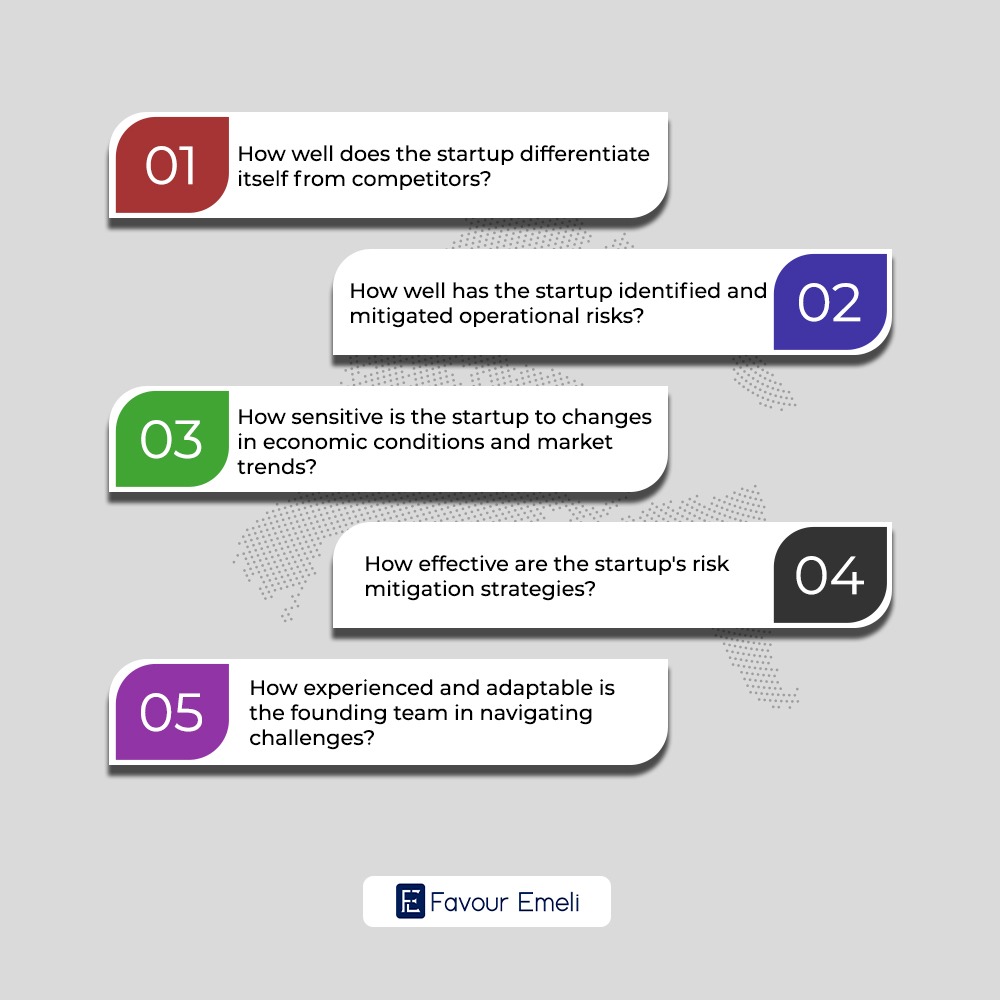Understanding the Risks and Rewards of Startup Business Investment
January 24, 2024 2024-07-03 14:14Understanding the Risks and Rewards of Startup Business Investment
Starting to invest in startups is like exploring unknown territory, where the possibility of making a lot of money goes hand in hand with a big dose of uncertainty. Here, any smart investor must grasp the fine line between taking risks and reaping rewards.
With my deep involvement in the entrepreneurial world, know-how, hands-on experience, and strong belief in being clear, I will provide a straightforward guide to understanding the ins and outs of investing in startups.
Let’s unravel the complexities together.
What are the Risks of Investing in Startups?
As an investor, startup investments have been a big part of my journey. The risks in this field are as varied as the startups themselves, each bringing unique challenges that need careful thought.
First, there’s the uncertainty in the early stages of startups. These businesses often operate on the cutting edge of innovation, where success depends on how well the market embraces them, breakthroughs in technology, and the ability to adapt quickly. Seeing the ups and downs that founders go through, I recognize that not every fantastic idea turns into a big success.
Additionally, dealing with market changes can be tough. The competition is always changing, and unexpected shifts can quickly make a promising startup struggle to keep up. From my experience, I’ve learned to carefully study market trends and anticipate possible disruptions, doing my best to lessen this risk.
The dynamics of the team and the risk of executing plans are also crucial. While a great idea is important for a startup, the team’s ability to put that idea into action is key. I’ve learned to look not only at how brilliant an idea is but also at how well the team can make it happen.
Lastly, dealing with the unpredictable nature of laws and regulations is a big challenge. Navigating through legal requirements needs a smart approach. My experiences have shown me how important it is to stay updated on changes in regulations, making sure that investments align with the evolving legal landscape.
Here are important questions you should ask to ascertain the risks of startup business investment.

How well you’re able to answer each question determines the overall risk level associated with the startup investment.
Related Article: Why Business Owners Make Bad Decisions (Plus Tips to Avoid Them)
How Do You Measure Risk in a Startup?
When it comes to figuring out how risky a startup business investment is, I go through a careful process. Here’s how I do it:
- Checking Everything: Before diving in, I make sure to thoroughly check everything about the startup. This means looking closely at how they do business, where they fit in the market, and who their competition is. I also take a good look at the people running the show, making sure they have the right skills and can handle tough situations.
- Understanding the Market: Knowing the market well is key. I look at trends, possible changes, and how well the startup can adapt to what’s happening. Figuring out who might be interested in what the startup is offering and how big it can grow is also crucial.
- Money Matters: Numbers tell a big part of the story. I dig into the startup’s financial health, how fast they’re spending money, and what they expect to earn. I also make sure they have enough money to keep going and growing.
- Being Ready for Trouble: Identifying problems is only one side of the coin. I also come up with plans to deal with issues that might pop up. Working closely with the startup’s leaders, we make sure they’re ready to face unexpected challenges.
- Checking the Team: A strong team is often a sign of a startup that can handle risks well. I look at not just their technical skills but also how well they work together and if they’re good at coming up with new ideas.
- Keeping Up with the Rules: Staying updated on what’s happening in the industry and following the rules is crucial. I make sure the startup is following the right regulations and is set up to deal with any legal issues.
- Thinking About the Future: I also think about the long-term picture. Can the startup grow, and is their plan sustainable? Considering factors like if they might run into too much competition or if their technology could become outdated helps in understanding the risks.
What is an Investment in a Startup Business?
As a consultant with lots of business experience, I think of investment in a startup business as a strategic allocation of capital into a promising entrepreneurial venture, to generate financial returns and contribute to the growth and success of the company.
It’s not just about giving money; it’s like forming a close partnership where resources, know-how, and networks are brought together to help the startup succeed. Investing in startups is a long-term game, not a quick win. It means sticking with the startup as it grows, from the beginning to later stages.
Startup investments inherently involve risk, but they also hold the potential for substantial rewards. It’s a delicate balance that requires a thorough understanding of the industry, market dynamics, and the specific challenges and opportunities the startup faces. Hence, a need to assess this risk-reward equilibrium, and ensure you make informed decisions that align with your financial goals.
Lastly, investing in startups is not just a financial decision; it’s a vote of confidence in innovation. It shows your support for the development of groundbreaking ideas, disruptive technologies, and novel business models.
Read: Why Attention to Detail is Critical in Business
Are Smaller Companies a Good Investment?
Thinking about investing in smaller companies? Here’s what to consider:
Big Growth Potential
Smaller companies can grow faster than big ones. They’re quick to adapt to changes in the market, which means they can expand rapidly and grab new opportunities. Check out how much a smaller company can grow before deciding to invest.
Watch Out for Risks
Investing in smaller companies comes with more risks. They might not have a lot of resources, making them sensitive to changes in the market, economic problems, and day-to-day issues. Make sure to look into these risks and find ways to reduce them through careful research.
Find Their Niche
Successful investments in smaller companies often happen when they offer something unique or different. Look into how a smaller company stands out from the competition. Understanding what makes them special is key to knowing if they can succeed and keep ahead.
Check the Team
In smaller companies, the people leading the way are super important. Look into the track record of the management team. See if they know the industry well and have a good plan for the future. A strong team is a good sign of the company’s success.
Mix It Up for Safety
Adding smaller companies to your investment mix can make your portfolio safer. While big companies bring stability, smaller ones can bring the chance for higher profits. Finding the right balance in your mix helps manage overall risks.
Keep an Eye on the Market
Economic changes and market trends can impact smaller companies. Before deciding to invest, look into how the overall economy is doing and what’s happening in the specific industry. This helps you figure out if smaller companies are in a good position to do well or might face challenges.
Tips to Understand the Risks and Rewards of Startup Business Investments
Understanding the risks and rewards of startup business investments involves a comprehensive and informed approach. Here’s a step-by-step guide to help you navigate this business stage:
- Start by gaining a solid understanding of the startup ecosystem. Familiarize yourself with common terms, industry trends, and the typical life cycle of startups.
- Clearly outline your financial goals and risk tolerance. Are you seeking high returns, long-term growth, or portfolio diversification?
- Thoroughly research potential investment opportunities. Scrutinize the startup’s business model, market positioning, competition, and founding team. Assess their growth prospects, financial health, and scalability.
- Assess the team’s experience, industry knowledge, and adaptability.
- Evaluate the startup’s burn rate, funding sources, and overall financial stability. A financially healthy startup is better positioned for growth.
FAQs on Investing in Small Businesses
How much should I invest in a startup?
The amount to invest depends on your financial goals, risk tolerance, and the specific investment opportunity. Consider diversifying your investment portfolio and avoid investing more than you can afford to lose.
Can I invest in startups if I’m not an accredited investor?
In some cases, yes. Crowdfunding platforms and Regulation A offerings provide opportunities for non-accredited investors to invest in startups. However, these opportunities may come with certain limitations.
What is the exit strategy for startup investments?
Common exit strategies include initial public offerings (IPOs), acquisitions, or mergers. The success of the exit strategy depends on the startup’s growth and market conditions.
How do industry trends impact startup investments?
Industry trends play a significant role in startup success. Stay informed about emerging trends, technological advancements, and changes in consumer behavior to assess how they may impact the startups in which you invest.
Conclusion
Investing in startups is like an exciting adventure with both risks and rewards. It’s tempting because you could make a lot of money, but it’s important to be smart and well-informed to handle the uncertainties. To succeed, it’s crucial to grasp the details of startup investing. This way, investors can not only face challenges but also play a part in the success stories that make up the world of startups.




